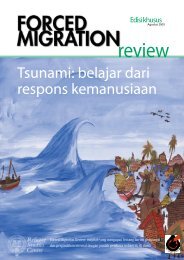FMR 42 full issue pdf - Forced Migration Review
FMR 42 full issue pdf - Forced Migration Review
FMR 42 full issue pdf - Forced Migration Review
Create successful ePaper yourself
Turn your PDF publications into a flip-book with our unique Google optimized e-Paper software.
60 Sexual orientation and gender identity and the protection of forced migrants<br />
<strong>FMR</strong> <strong>42</strong><br />
Markus completed his deployment without<br />
problem. He’s since worked for other aid<br />
agencies in countries where homosexuality is<br />
criminalised. All his postings so far have been<br />
unaccompanied but now I hear he’s looking for<br />
a post where his partner can join him and they<br />
are considering adopting a child. But it’s not<br />
just in the developing world that Markus will<br />
face challenges about his sexuality. As I write<br />
these final sentences, hundreds of thousands<br />
of people are protesting on the streets of Paris<br />
about their government’s plans to give gay<br />
couples the right to marry and adopt children. 2<br />
The gay humanitarian’s perspective<br />
I have always chosen to keep a low profile<br />
regarding my sexual orientation when<br />
working overseas, through a combination of<br />
self-preservation and recognition that being<br />
open could significantly compromise my<br />
ability to do my job. There may be those who<br />
would criticise me for it but unfortunately<br />
being openly gay and being able to do<br />
the work I have gone to these countries to<br />
undertake is not currently compatible. Of the<br />
six countries in which I have worked as an<br />
expatriate for NGOs, homosexuality is illegal<br />
in five of them; in the sixth, as with the other<br />
five, there is certainly a serious social and<br />
cultural taboo. In truth I have usually been<br />
more concerned with the more immediate<br />
potential risks of compromised working<br />
relationships, rejection, harassment, blackmail<br />
or worse, than the legal implications.<br />
That said, I have lived with my partner<br />
in several countries and to date we have<br />
not experienced any problems, since two<br />
expatriates sharing accommodation is not<br />
in itself at all unusual. I also think that it is<br />
probably easier to fly under the radar as two<br />
women in a relationship, as opposed to two<br />
men, if only because suspicions about and<br />
hostility towards homosexuality in many<br />
places are frequently heightened towards<br />
men. Perhaps unfairly I generally work on<br />
the assumption that local colleagues probably<br />
don’t have an entirely favourable attitude to<br />
homosexuality. I may have done some people<br />
a disservice by making these assumptions<br />
but until I have good grounds to believe<br />
that they will be tolerant and accepting, and<br />
considering the potential risks, this is how<br />
I feel I need to proceed. I can count on one<br />
hand the number of local colleagues that I<br />
have been directly open with over the years.<br />
If you were to ask me what my employer<br />
would or could do if it were the case that I<br />
experienced harassment inside or outside of<br />
work overseas due to my sexuality, the fact<br />
is I don’t know. I remember the subject being<br />
directly addressed in orientation sessions;<br />
where it concerns the laws of a country, you<br />
have to accept that there is probably little an<br />
employer could do. Harassment inside the<br />
workplace is a different <strong>issue</strong> and – when<br />
dealing with very entrenched negative<br />
attitudes to homosexuality – can be very<br />
difficult to address. However, I do think it<br />
is important that when staff members are<br />
going overseas to places where being gay<br />
is not socially or legally accepted, there<br />
should be space for this to be discussed<br />
with managers and advisors if they want<br />
to. There is also room for improvement in<br />
the guidance and orientation available,<br />
including the expectations and responsibilities<br />
of both staff and employers, including<br />
on <strong>issue</strong>s such as accompanied status.<br />
It can be alienating working in a place where<br />
you could potentially be imprisoned for<br />
simply being who you are, and with the<br />
awareness that people you count as good<br />
colleagues and friends would struggle to<br />
accept you if they knew the truth – or might<br />
reject you completely. The compromises that<br />
have to be made are not always comfortable.<br />
My own experiences and those of others I<br />
have met demonstrate that with discretion<br />
and care these things can be managed,<br />
although I admit that I had to accept a long<br />
time ago that if I want a <strong>full</strong> and open life,<br />
including children, ultimately there will be<br />
countries where I will not be able to live.<br />
The authors of this article have asked not to be<br />
named.<br />
1. To protect privacy, names have been changed.<br />
2. www.bbc.co.uk/news/world-europe-21004322 ‘Mass Paris rally<br />
against gay marriage in France’, 13 January 2013




